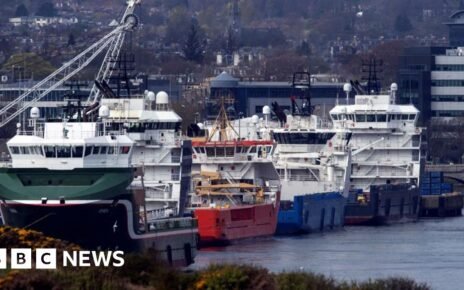By Oliver Slow, BBC News
 PA Media
PA MediaAbout 1,500 Tata Steel workers will begin an indefinite strike next month over the company’s plans to cut thousands of jobs, the trade union Unite has said.
The move is the first time in more than 40 years that steel workers in the UK have taken strike action, the union added.
About 2,800 Tata Steel workers will lose their jobs when the company closes both blast furnaces in Port Talbot by the end of September.
The strike will begin on 8 July at Port Talbot and Tata’s Llanwern site in Newport.
Sharon Graham, Unite general secretary, said Tata’s workers were “not just fighting for their jobs – they are fighting for the future of their communities and the future of steel in Wales”.
She said the strikes would continue until the firm “halts its disastrous plans”.
Unite members at Tata previously observed an overtime ban and “work to rule” – meaning refusing to do work that is optional in their contracts.
Tata has urged Unite to suspend the action and return to discussions along with other unions.
It previously warned it could withdraw the enhanced redundancy packages on offer if workers went on strike.
Chief executive Rajesh Nair said the “most favourable financial package” it had ever offered would not be paid if staff took part in industrial action.
The company plans to build a £1.25bn electric arc furnace to produce steel in a way which is less polluting than traditional blast furnaces, but requires fewer workers.
Tata said the move would secure the future of steel making at the site and the UK government is contributing £500m towards the cost of the project.
A gamble by Unite
Strike action is as serious as it gets for workers and the company.
Unite has behaved differently to the other two unions in Port Talbot, who remain in discussion with Tata Steel.
Going alone is a gamble by Unite.
Tata has already said that its most favourable redundancy offer to workers is off the table due to the union’s industrial action, and it could yet be taken to court. Tata Steel maintains that “irregularities” in Unite’s ballot mean any industrial action is unlawful, though it hasn’t asked a judge to rule on the issue.
While workers held a rally this week to mark the beginning of a work-to-rule and an overtime ban, Unite’s 1,500 membership may find it harder to walk out on strike at Port Talbot and Llanwern.
They would do so while most of their colleagues in other unions were still speaking to the company about their redundancies, and Unite’s stance has caused significant tension among the multi-union team who are negotiating with Tata.
This is also a political gamble for Unite, with the spectre of steel strikes beginning days after the general election and posing an immediate headache to whoever enters 10 Downing Street.



